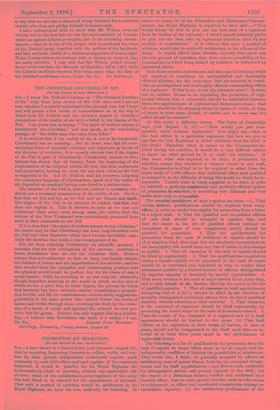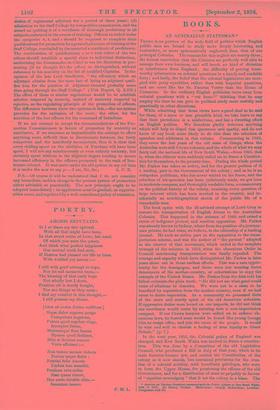PROMOTION BY SELECTION.
[TO THE EDITOR OF THE .EPROTATOR.")
have shown in a former letter (vide Spectator, August 26), that by requiring Inspecting Generals to collate, verify, and con- firm by their opinion independent confidential reports, made separately by each field-officer and each captain of the regiments inspected, it would be possible for bis Royal Highness the Commander-in-Chief to ascertain, without any appreciable risk of error, which of the subalterns in every regiment of the Army was best fitted to be selected for the appointment of adjutant. That such a method of selection would be satisfactory to his Royal Highness, we have his own authority for believing. In answer to Query 56 of the Promotion and Retirement Commis- sioners, his Royal Highness is reported to have said :—" You would always be able to pick out the best man of a regiment from the feeling of the regiment ; I would myself infinitely prefer to pick out the best man by regimental intuition than by any method of examination." It is evident that such a method of selection would also be perfectly satisfactory to the officers of the Army. It would afford them absolute security that merit was the sole ground of selection, that there was no possibility of the Commander-in-Chief being misled by mistaken or influenced by interested advice.
Now those natural endowments and that special training which are required to constitute an accomplished and thoroughly efficient adjutant, are the very same that are required to consti- tute an accomplished and thoroughly efficient commanding officer of a regiment. If this be SO, is not the inference clear? Is there not an evident fitness in so regulating the promotion of regi- mental officers, that a connection should be established between these two appointments of adjutant and lieutenant-colonel ; that the one should be the stepping-stone by means of which, in time of peace, in most cases, though of course not in every case, the other should be reached ?
At this point a difficulty occurs. The Duke of Cambridge says (vide Report, Q. 61) :—" How would you put com- parative merit between regiments ? You might say,—this is the best officer in a particular regiment, but how are you to say that the 61st Regiment is better officered than the 62nd or the 63rd? Therefore when it comes to the Commander-in- Chief having the selection, it would be a very difficult matter to know on what ground he is to make his selection." If this were what was required to be done, if promotion by selection meant that whenever a vacancy occurs in any rank, the Commander-in-Chief is to be required to select from the whole body of 6,000 officers that individual officer best qualified to succeed to it, the difficulty of doing this would no doubt be in- superable. Luckily what is really required to be done, in order to establish a perfectly satisfactory and perfectly efficient system of promotion by selection, is something very different and very much more easy to accomplish.
The essential conditions of such a system are these :-1. That certain definite qualifications should be required from every officer, in order to render him eligible for promotion from a lower to a higher rank. 2. That the qualified and unqualified officers. of each rank should be arranged in separate lists, and that the senior in the list of qualified officers (subject to exceptions in cases of very conspicuous merit) should be selected for promotion. 3. That the qualifications for promotion from the rank of subaltern to captain should be of so simple a kind, that none but the absolutely incompetent or the incorrigibly idle would incur any risk of failure in the attempt to qualify. 4. That all vacancies in the rank of captain should be filled up regimentally. 5. That the qualifications required to render a captain eligible to be promoted to the rank of major- should be so restricted and regulated as only to render their attainment possible by a limited number of officers, distinguished by superior capacity or favoured by special opportunities. 6. That every vacancy in the rank of major should be an Army step, and in each branch of the Service filled by the senior in the list of qualified captains. 7. That all vacancies in Staff appointment& (excepting that of A.D.C.) should be filled by the selection of specially distinguished individual officers from the list of qualified captains, without reference to their seniority. 8. That vacancies• in the command of regiments should be filled regimentally, by promoting the senior major to the rank of lieutenant-colonel. 9. That the tenure of the command of a regiment and of a Staff' appointment should be limited to five years. 10. That Staff officers at the expiration of their terms of service, in time of peace, should not be reappointed to the Staff until after an in- terval of at least three years spent in the performance of regimental duties.
The following is a list of qualifications for promotion from the- rank of captain to major which seem to me to comply with the- indispensable condition of limiting the possibilities of attainment.. They would also, I think, be generally accepted by officers an satisfactory tests of special fitness, both for the command of regi- ments and for Staff appointments :—(a) Brevet rank, conferred for distinguished service and proved capacity in the field ; (b) the report of a lieutenant-colonel, verified and confirmed by a General officer, that on some special occasion, such as a fire at sea. or a shipwreck, an officer had manifested conspicuous courage or remarkable capacity ; (c) the satisfactory performance of the duties of regimental adjutant for a period of three years ; (d) admission to the Staff College by competitive examination, and the award on quitting it of a certificate of thorough proficiency in all subjects embraced in the course of training. Officers included under the categories a, b, and c should be required to complete their qualifications for promotion by a prescribed course of training at the Staff College, concluded by the award of a certificate of proficiency. The combination of qualifications a or b with either of the two others should establish a special claim to individual distinction, authorising the Commander-in-Chief to use his discretion in pro- moting (if he thought fit) the officer so distinguished, without reference to his seniority on the list of qualified Captains. In the opinion of the late Lord Sandhurst, " the efficiency which an adjutant obtains from the mere fact of being an adjutant quali- fies him for the position of Adjutant-General probably more than going through the Staff College." ( Vide Report, Q. 2,259.) The effect of these or similar regulations would be to establish selection tempered by seniority, instead of seniority tempered by rejection, as the regulating principle of the promotion of officers. The difference between these two systems is this,—the one system provides for the exclusion of the worst; the other, for the selection of the best officers for the command of battalions.
If we are content to accept the recommendations of the Pro- motion Commissioners in favour of promotion by seniority as conclusive, if we renounce as impracticable the attempt to effect anything more difficult than to discriminate between the fairly competent and the manifestly incompetent, then it is clear that every shilling spent on the abolition of Purchase will have been spent, I will not say mischievously or even entirely uselessly, but certainly spent without in the slightest degree tending to secure increased efficiency in the officers promoted to the rank of lieu- tenant-colonel. It was easier under the old system to say sell than it is under the new to say go.-1 am, Sir, &c., A. C. R.
P.S.—Of course it will be understood that I do not consider any immediate, sudden change in the present system of promotion either advisable or practicable. The new principle ought to be adopted immediately ; its application must be gradual, as opportu- nities occur, and regulated by a well-considered policy of transition.



































 Previous page
Previous page